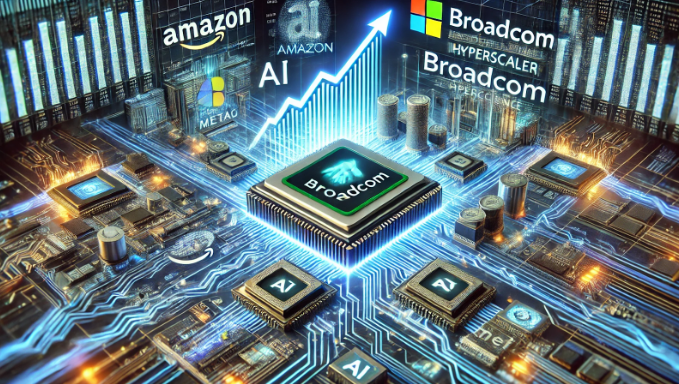DEEPSEEK SPOOKED THE MARKET, THIS AI STOCK CASHED THE CHECK
(AVGO), (MSFT), (AMZN), (GOOG), (META), (INTC), (MRVL)
The panicked messages flooded my inbox last week as tech stocks took a nosedive.
One subject line simply read: "BROADCOM - SELL NOW???" Another longtime reader called me at 5:30 AM (clearly forgetting about time zones) asking if the AI bubble had finally burst. His portfolio was bleeding red and he was ready to hit the eject button on everything tech-related.
It's times like these when having decades of market experience comes in handy. I've seen this movie before - different characters, same plot.
While panicked investors were selling, Broadcom delivered Q1'25 earnings that sent shares up by over 8%. Despite Microsoft (MSFT) pulling some data center leases, the recent selling has created a significant buying opportunity for AVGO shares.
The numbers tell the real story here. Broadcom's semiconductor business grew 11% year-over-year, with 50% of the $8.2 billion in semiconductor revenue coming from AI infrastructure.
When half your semiconductor business is driven by the hottest sector in tech, you've positioned yourself exactly where you need to be.
Why such strong AI demand? Sources at Microsoft, Amazon (AMZN), and Google (GOOG) confirm the DeepSeek V3 models have lit a fire under their AI development teams.
This has accelerated the timeline for all major players to improve their AI systems, with hyperscalers now racing to deploy more advanced models.
Broadcom's management isn't sitting idle amid this AI acceleration. They're ramping R&D investments in next-generation accelerators, targeting 2nm AI XPUs with 10,000 teraflops capability.
For context, that's massive computational power that will drive the next wave of AI applications. They're also enabling clusters scaling to 1 million XPUs - the infrastructure backbone needed for training tomorrow's frontier models.
The technical progress is equally impressive.
A senior Broadcom engineer I met last month revealed they've doubled RAID capacity for existing Tomahawk sites and will begin sampling 1.6T bandwidth switches soon.
These advances put Broadcom at the center of the AI infrastructure buildout that every major tech company needs.
All this positions Broadcom for explosive growth.
By FY27, their AI addressable market is projected to reach $60-90 billion. They've already added two more hyperscalers as customers, bringing the total to four.
The company now develops custom AI chips for Alphabet, Microsoft, Amazon, Meta (META), and ByteDance (the parent company of TikTok) - essentially becoming the arms dealer in the AI arms race.
The near-term outlook is equally promising. For Q2'25, Broadcom expects AI revenue to reach $4.4 billion, up 44% from last year. These aren't small percentage gains on tiny revenue bases - we're talking billions in growth from already substantial numbers.
Beyond AI, the picture is more nuanced but still positive overall.
Traditional semiconductors face some growth pressures, though telecom customers should increase spending in Q2'25. Enterprise networking will likely remain flat in the first half of the year due to inventory digestion.
Meanwhile, enterprise software has been a bright spot, growing 47% year-over-year.
Management is successfully converting perpetual licenses to subscription models, with 60% converted so far.
This transformation to recurring revenue improves visibility and stability in the business model - something Wall Street consistently rewards with higher multiples.
Innovation continues across the business.
One notable example is their VMware Private AI Foundation with NVIDIA, already adopted by 39 enterprise customers.
This platform helps companies manage GPU infrastructure for their AI workloads - positioned exactly where enterprise spending is heading as AI moves from experimental to production environments.
Looking at the financials, the picture remains strong. For Q2'25, I'm forecasting $14.9 billion in revenue and $1.59 EPS.
Inventory levels increased to $1.9 billion (56 days on hand) to support the AI production ramp-up.
The company has managed its balance sheet well, paying down $495 million in fixed-rate and $7.6 billion in floating-rate debt, ending with a reasonable 1.64x leverage ratio.
Is there risk? Certainly.
If Microsoft's canceled data center leases truly signal excess compute capacity across the industry, we could see a broader slowdown in XPU investments.
But the capital expenditure guidance from all major hyperscalers suggests this is isolated, not systemic.
Valuation remains attractive despite the growth story.
AVGO shares currently trade at a significant discount to peers like Marvell Technology (MRVL) in the custom ASIC market.
In fact, Broadcom CEO Hock Tan explicitly stated they're "too busy" with AI and VMware to consider an Intel (INTC) purchase - a signal of management's focus on organic growth opportunities rather than distracting acquisitions.
Looking at the broader market context, the last two years delivered remarkable gains with minimal pullbacks. We're now experiencing that needed pullback, which could continue for 3-6 months.
After that, I expect markets to finish 2025 in positive territory, with AI leaders like Broadcom leading the charge.
My response to those panicked emails was simple: use this opportunity to build a position in AVGO.
When a company dominates its space with 50% of revenue coming from the fastest growing segment in tech, you don't sell - you buy more.
And yes, in case you're wondering, I own the stock. I've been adding on every dip.


